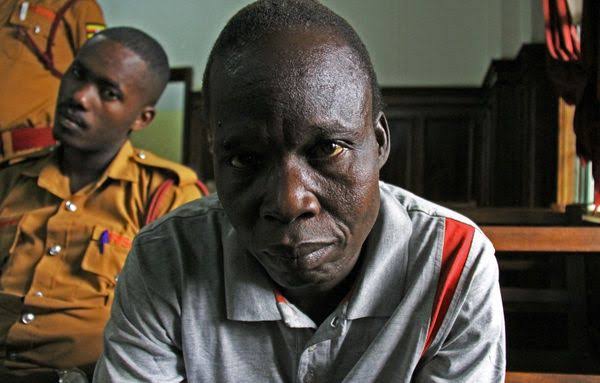Former LRA Commander Sentenced to 40 Years in Groundbreaking Ugandan War Crimes Trial
3 min read
Former Lord's Resistance Army commander Thomas Kwoyelo said he was abducted and turned into a soldier by the group at the age of 12

Former Lord's Resistance Army commander Thomas Kwoyelo said he was abducted and turned into a soldier by the group at the age of 12
In a significant legal milestone, a Ugandan court has sentenced Thomas Kwoyelo, a former commander of the infamous Lord’s Resistance Army (LRA), to 40 years in prison after he was found guilty of multiple war crimes. This landmark ruling marks the first time a commander from the LRA has been convicted by a Ugandan court.
Kwoyelo faced 44 charges, including serious offenses such as murder, rape, kidnapping, and pillaging. Throughout the trial, he maintained his innocence regarding all allegations made against him. His trial took place in Gulu, a city in northern Uganda that was severely impacted by the LRA’s violent campaigns for over two decades.
The LRA, which emerged in the late 1980s, is notorious for committing heinous atrocities not only in Uganda but also in neighboring countries. One of the most brutal incidents linked to Kwoyelo’s command occurred in 2004, when LRA forces attacked a camp for displaced civilians at Pagak. In this horrific assault, dozens of women and children were beaten to death with wooden clubs, underscoring the brutality of the group’s actions.
The International Crimes Division of the Ugandan High Court ultimately decided against imposing the death penalty or life imprisonment on Kwoyelo. This leniency was based on the fact that he had been abducted by LRA fighters at a young age and coerced into military service. Kwoyelo has stated that he was only 12 years old when he was taken by the group, which was infamous for abducting children and forcing them into roles as soldiers or sex slaves.
During the trial, the court recognized Kwoyelo’s expressions of remorse and concluded that he no longer posed a threat to society. This assessment contributed to the decision not to impose the harshest penalties available under Ugandan law.
The LRA, led by Joseph Kony, claimed to be fighting to establish a government guided by the Biblical Ten Commandments. However, the group became infamous for its brutal tactics, including amputations and other forms of extreme violence. The conflict displaced hundreds of thousands of people, primarily in northern Uganda, before the LRA extended its operations into the Democratic Republic of Congo and the Central African Republic.
Kwoyelo was arrested in 2009 and initially faced 78 charges. However, he was acquitted of three murder charges, and 31 additional charges were dismissed during the proceedings. Ultimately, he will serve a total of 25 years in prison, considering he has already spent 15 years in remand awaiting trial.
Kwoyelo’s legal team has announced plans to appeal his convictions, and the court has granted them a 14-day window to file the appeal. Additionally, the issue of reparations for the victims of Kwoyelo’s crimes will be addressed in a separate court hearing.
This case stands in contrast to the international legal proceedings against other LRA commanders. In 2021, the International Criminal Court in the Netherlands sentenced Dominic Ongwen, another LRA commander, to 25 years in prison. Like Kwoyelo, Ongwen was spared a life sentence due to the circumstances of his abduction and the traumatic experiences he endured as a child.
The sentencing of Thomas Kwoyelo is a crucial step in the ongoing struggle for justice in Uganda and reflects the complexities involved in prosecuting individuals who have been both perpetrators and victims of war. The court’s decision highlights the need for a nuanced approach to justice, recognizing the circumstances of individuals who were coerced into violent actions while holding them accountable for their crimes.
As the legal process continues, including the potential appeal and discussions on reparations, the case serves as a reminder of the lasting impacts of conflict and the importance of seeking justice for all affected parties in Uganda’s tumultuous history. The outcome may influence future trials and discussions surrounding accountability and reconciliation in post-conflict societies.